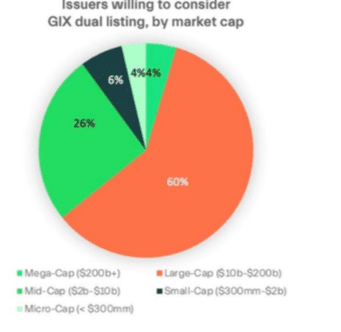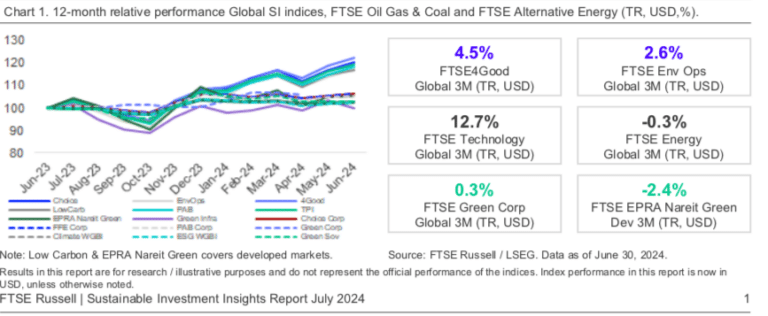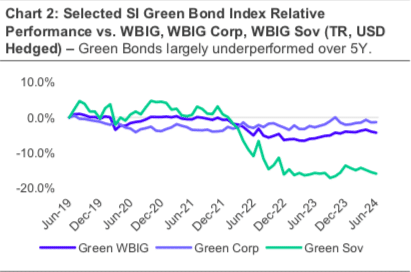A group of former New York Stock Exchange veterans are aiming to launch an exchange to dual list companies who want to highlight their credible commitments to reach net zero, and help them attract capital for the green transition.
The Green Impact Exchange (GIX) has filed an application with the Securities and Exchange Commission. Charles Dolan, co-founder and chief operating officer of GIX, told Markets Media that combining environmental, social and governance into ESG confuses investors, so the exchange is focusing on climate change.
“If you are driving slave labour to work in an electric bus, are you a good or a bad company?” he asked.
Dolan continued that there are more than 600 ESG reporting frameworks, none of whom correlate, most are backward-looking and most are voluntary without accountability and enforcement. Therefore, the founding team of GIX wanted to use capital market mechanisms to create a forward looking view, and accountability around the promises that companies are making towards meeting goals for net zero emissions.
“Anyone can fly to Davos and say they are going to be carbon neutral in 2050, but that is three CEOs from now, and it is not going to be their problem when that date is due,” said Dolan.
In order to ensure that companies make credible public commitments, GIX came to the conclusion that listing standards are an interesting way to embed high-level governance principles as they are a contract between the exchange and the firms who choose to list on the venue. If the targets are met, the companies should be rewarded by attracting capital for the green transition.
“Coming from the NYSE, we understood the fact that the listing world is a duopoly,” said Dolan. “Others have tried to attract primary listings and failed miserably, so we are asking companies listed on NYSE or Nasdaq to dual list on GIX as an added strategic credential.”
Co-founder Daniel Labovitz is chief executive of GIX and a former head of regulatory policy at the NYSE. The team also includes Louis Pastina, market structure senior advisor to GIX, who is former executive vice president of operations at the NYSE.
There has been controversy in the US over the SEC mandating ESG disclosures. However, Dolan said GIX has support on both sides of the aisle because it is a free market solution, where companies can voluntarily choose to dual list if they see value in being on the exchange.
Listing standards
Companies listed on NYSE or Nasdaq can already produce sustainability reports, and arguably attract ESG investors. However, Dolan said that companies can separate themselves from potential greenwashing accusations by meeting the GIX listings requirements, so there is more accountability and enforceability. The SEC oversees that GIX is enforcing its listing standards, which Dolan described as a robust measure that does not currently exist in the ESG landscape.
“We are trying to make it easy for investors to trust the information that has been provided and make decisions about who they want to support,” said Dolan.
Shiva Rajgopal, Columbia Business School professor and GIX advisor, said in a statement: “There’s a tremendous financial opportunity to bring together sustainable-minded investors with companies working hard to meet their environmental commitments. For that opportunity to be realized, there needs to be better transparency and accountability of sustainability initiatives and reporting.”
GIX has created three pillars of governance – values, vision and verification – which Dolan said are embedded in the 846 pages of its SEC application.
There has to be a value statement on what the company is trying to achieve and somebody within the organisation has to update the board on progress towards the stated targets. GIX also requires transparent short, mid and long-term waypoints to be provided to investors. Companies also have to adopt a generally accepted reporting framework of their choice, such as TCFD (Task Force on Climate-Related Financial Disclosures).
As a result, investors can decide how to react if companies do not meet their targets. Dolan used the analogy that NYSE and Nasdaq do not guarantee if a company is going to be profitable. However, the exchanges have an enforcement process if companies provide fraudulent information.
“As long as companies are meeting our listing requirements, we would not delist them,” said Dolan. “If they are out of compliance, there is a procedure similar to NYSE and Nasdaq in terms of giving them a warning and working with them to remediate the problem.”
Dolan stressed that GIX is not looking to identify winners in the green company.
“We are trying to help companies, whether they are green, brown or black to navigate the net zero journey,” he said. “We feel our greatest success would be to engage with the oil and gas industry in a productive way that would allow them to think about their green governance in a way that does not mean wiping out their business.”
He argued that moving the needle 1% to 3% in the oil and gas industry towards green energy could be even more powerful than getting 50 or 100 green startups listed on GIX.
In May this year giant pension fund CalPERS, voted against all sitting members of ExxonMobil’s board of directors, including the chief executive, at the oil and gas company’s annual general meeting. ExxonMobil had threatened a lawsuit against a shareholder group that made a non-binding proposal related to the company’s climate change efforts.
Dolan said ExxonMobil would be able to list on GIX if the firm met the listing standards.
“I think that divesting from the whole energy complex is the wrong way to go about trying to change the world,” he said. “Do you want them to have the capital they need in order to pivot from what they are currently doing?”
He also gave the example of the aviation industry where there is not enough sustainable fuel to fly planes around the globe. However, this does not preclude them from being greener than they currently are and starting the transition.
Potential growth
Over the last 16 months GIX has contacted more than 700 companies of all sizes, and Dolan said more than 230 companies want to be kept updated on progress with the regulatory approval.
The venue has also engaged with the large market makers about participating, and worked through a pricing model which could attract liquidity.
“We realise that in order to be taken seriously, we need a viable percentage of volume,” said Dolan.
GIX has raised about $3.7m, and is discussing a Series A funding round with a number of banks in the US and Europe and a large buy-side firm.
Sustainable investment performance
FTSE Russell, the index and data arm of the London Stock Exchange Group, said in its latest quarterly Sustainable Investment Insights that the second quarter was strong for sustainable equity index performance. All five main sustainable global indices performed ahead of the market.
“ESG (FTSE4Good) stood out as the best performer in Q2, as well as in Q1 and over the last 12 months,” added FTSE Russell. “Looking at multi-assets, SI corporates outperformed, while SI sovereigns underperformed as did SI infrastructure and real estate.”
However, FTSE Russell also warned that the sustainable investing market continues to struggle with weak fund flows, overcapacity in renewables and electric vehicles and changing regulations.
In the year to date ESG focused indices have been outperforming climate and green economy indices according to FTSE Russell. The report said: “Typically, climate has outperformed ESG in upmarket periods, however this relationship has broken down recently.”
Renewable energy was the worst performing sector of the FTSE All World over 12 months but started to stage a recovery in the second quarter as investors are starting to see the sector as a beneficiary of artificial intelligence.
“Energy demand from data centres, which consume a lot of electrical power, ~2-3% globally, has been growing rapidly,” said FTSE Russell. “This demand is likely to accelerate even further with the rapid growth of AI, which requires 4-5 times the power of a normal server. This is at odds with the environmental commitments of the large technology companies, which has led them to become major buyers of renewable energy.”
Sustainable fund flows remained flat in the second quarter compared to higher flows into the broader market.
Green bond performance was negative for sovereigns and only narrowly positive for corporates in the second quarter, with returns impacted by rising yields across most developed market economies. However, FTSE Russell said that despite recent weakness, 12-month returns for green bonds remain positive, thanks to high yields and some market repricing in rates since the end of 2023.
“On a relative basis, green bond indices have largely underperformed their non-green counterparts over five years,” added FTSE Russell. “However, recent relative performance has been more positive, especially for green corporate bonds, which have benefitted in recent months from an overweight in banks and other financials, following their solid performance since the US banking crisis in 2023.”








